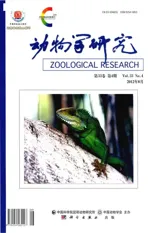Editorial
2012-01-27YapingZHANG
Editorial
AsZoological Researchenters its 33rd year of publication, let us reflect back on the last three decades of dramatic change to China and the scientific community. In the latter half of the 20th century, scientific research was almost exclusively published in the United States or Europe. We startedZoological Researchin 1980 with the goal of creating a strong Chinese-language journal to support regional and national research and push towards developing an innovative and collaborative Chinese scientific community. Over the next two decades, we worked diligently to makeZoological Researchin to one of China’s top life science journals, soliciting manuscripts from across the country. By the mid 1990s,however, we realized these efforts were not enough. Chinese researchers and research on China had begun to play a much larger role in the international scientific community. Accordingly, we decided to open up submissions to include articles published in English by both Chinese and foreign scientists. In 1996, we published our first set of English articles, all by Chinese authors, detailing regional findings: a new genus of dragonfly in Tibet, the nesting patterns of ants, and a study of snake karyotypes from Yunnan province.
After opening submissions to both English and Chinese articles,Zoological Researchbegan to gain international traction, publishing articles in both languages on a variety of subjects, areas, and from researchers across the globe.English-language submissions to theZoological Researchsteadily increased, mirroring China’s rise to become a major player in the global scientific community as the no. 2 global producer of research, accounting for 14% of all research in 2010, publishing over 200,000 articles annually. Our journal has seen similar trends, embracing a strong spirit of international outreach and cooperation by annually publishing a third of our 100+ articles in English. We have likewise published two special issues on primates and animal models of human diseases and are now drawing submissions world-wide in preparation for a third. In 2010, we reached a critical milestone whenZoological Researchbecame indexed by PubMed/Medline, in addition to Biological Abstracts, Zoological Record, and Chemical Abstracts, among others. Likewise, today nearly a third of our 66 member editorial review board is based outside China.
In the growing spirit of international cooperation that has so deeply enriched the scholarship of our journal, we are pleased to announce that starting this month,Zoological Researchis a full dual-language publication, concurrently publishing Chinese and English issues. We moved to this new format in order to take advantages of our journals two great strengths: a strong regional focus of the finest Chinese scholarship and a growing, internationally focused array of English-language research submitted by authors around the globe. We hope this new format maintains our distinction as one of China’s leading zoological journals while also embracing a new international outlook. To aid in this endeavor,our sponsoring institution, the Kunming Institute of Zoology, has hired an in-house language editor from the United States who will be offering complimentary English language editing on incoming research and working closely with our submitting authors on refining their manuscripts for publication in the newZoological Research.
At this time, we would also like to make a special invitation to our readers who are interested in serving as singleissue Guest Editors for upcoming issues. Researchers interested in organizing special themed issues to explore a particular topic are heartily invited to contact our editor-in-chief, Zhang Ya-ping for more details. As always, thank you for your constant support of our journal and our work. Please continue sending your prospective manuscripts and following our journal as we continue in our efforts to makeZoological Researcha globally known and respected forum for zoological research.
Best,
Yaping ZHANG
